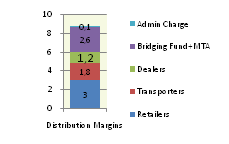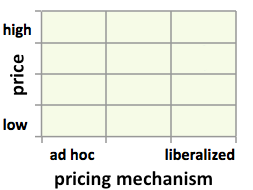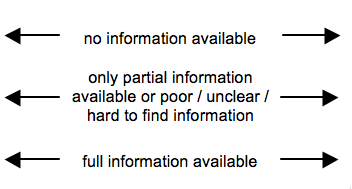Difference between revisions of "Fuel Prices Nigeria"
***** (***** | *****) m |
***** (***** | *****) |
||
| Line 1: | Line 1: | ||
{{Fuel Price Factsheet | {{Fuel Price Factsheet | ||
|Fuel Price Country=Nigeria | |Fuel Price Country=Nigeria | ||
| + | |Fuel Pricing Policies=The „Petroleum Products Pricing Regulatory Agency“ (PPPRA) is regulator and supervidor for the downstream market for liquid fuels in Nigeria. The PPPRA website offers plenty of information regarding fuel pricing policies, legislative and administrative framework and actual price compositions (http://www.pppra-nigeria.org). | ||
| + | |||
| + | PPPRA calculates „expected open market“ retail prices for all liquid fuels. The downstream sector is privatized in Nigeria. While there is a liberal, non-subsidized pricing for diesel, gasonline prices are regulated and immensely subsidized by the government (see 2.). However, an „Expected Open Market Price“ for gasoline (without subsidies) is published as well (see 1., 2-year-trend), so the extent of subsidies on gasoline can be recognized by customers. Pricing templates are published on a daily basis! | ||
| + | |||
| + | The „Petroleum Support Fund“ (PSF) basically finances the subsidy of gasoline. It is also stated, that PSF is being used for flattening volatile world market prices using a slate-calculation: A clearance between actual prices and calculated prices is being done between PSF and the distributors. | ||
| + | |||
| + | The pricing structure includes several taxes; However, all taxes have been zero as of Feb.2011. | ||
| + | |||
| + | The overall cost and pricing structure is quite powerful, as it accounts for future eventualities as the end of fuel subsidies, imposing of taxes and the deregulation or regulation of fuel types. | ||
| + | |||
| + | "Gasoline prices are uniform, controlled by government, and only infrequently adjusted. The gasoline price was ₦65 a liter between Aug 2005 (US$0.50) and Dec 2011 (US$0.41), except in 2007 and 2008 when it was raised to ₦70 a liter. Diesel prices have been deregulated for years. A Jun 2009 presidential directive deregulated the price of kerosene for household use, but Nigerian National Petroleum Corporation (NNPC) continues to sell kerosene at a heavily subsidized price of ₦50 (US$0.32) a liter and receive reimbursement from government. Gasoline pricing has been highly politicized in Nigeria and labor unions strongly oppose deregulation. Government removed the gasoline subsidy on Jan 1, 2012 and allowed the retail price to rise to ₦141 (US$0.89) a liter, but reduced it to ₦97 (US$0.61) following widespread protests. A market with deregulated diesel and regulated gasoline prices is unusual, leading to much greater apparent consumption of gasoline than diesel. According to IEA data, the gasoline-to-diesel consumption ratio increased from 2 in 2000 to 7 in 2010, nearly triple the second highest ratio in the world (United States) and possibly suggesting increasing smuggling of subsidized gasoline. Petroleum Support Fund (PSF) reimburses companies for under-recoveries based on international product prices and costs, and Petroleum Equalization Fund Management Board equalizes transportation costs for pan-territorial pricing. A House of Representative investigation released in 2012 found a number of abuses and questionable transactions under PSF, including subsidy payments made to companies that had not applied for registration, and registering and paying companies with no infrastructure." (Source: Kojima, Masami. (2013, forthcoming). “Petroleum product pricing and complementary policies:Experience of 65 developing countries since 2009.” Washington DC: World Bank.) | ||
|Fuel Currency=NGN | |Fuel Currency=NGN | ||
|Fuel Price Exchange Rate=148.6 | |Fuel Price Exchange Rate=148.6 | ||
| Line 15: | Line 26: | ||
Source: http://www.pppra-nigeria.org/pricingtemplate.asp | Source: http://www.pppra-nigeria.org/pricingtemplate.asp | ||
|Fuel Price Composition 2=GIZ_IFP2012_Nigeria2.png | |Fuel Price Composition 2=GIZ_IFP2012_Nigeria2.png | ||
| − | |||
| − | |||
| − | |||
| − | |||
| − | |||
| − | |||
| − | |||
| − | |||
| − | |||
|Fuel Matrix Pricing Mechanism=2 | |Fuel Matrix Pricing Mechanism=2 | ||
|Fuel Matrix Price Level=2 | |Fuel Matrix Price Level=2 | ||
Revision as of 16:02, 13 February 2013
Part of: GIZ International Fuel Price database
Also see: Nigeria Energy Situation
Fuel Pricing Policies
| Local Currency: | NGN |
| Exchange Rate: | 148.6
|
| Last Update: |
The „Petroleum Products Pricing Regulatory Agency“ (PPPRA) is regulator and supervidor for the downstream market for liquid fuels in Nigeria. The PPPRA website offers plenty of information regarding fuel pricing policies, legislative and administrative framework and actual price compositions (http://www.pppra-nigeria.org).
PPPRA calculates „expected open market“ retail prices for all liquid fuels. The downstream sector is privatized in Nigeria. While there is a liberal, non-subsidized pricing for diesel, gasonline prices are regulated and immensely subsidized by the government (see 2.). However, an „Expected Open Market Price“ for gasoline (without subsidies) is published as well (see 1., 2-year-trend), so the extent of subsidies on gasoline can be recognized by customers. Pricing templates are published on a daily basis!
The „Petroleum Support Fund“ (PSF) basically finances the subsidy of gasoline. It is also stated, that PSF is being used for flattening volatile world market prices using a slate-calculation: A clearance between actual prices and calculated prices is being done between PSF and the distributors.
The pricing structure includes several taxes; However, all taxes have been zero as of Feb.2011.
The overall cost and pricing structure is quite powerful, as it accounts for future eventualities as the end of fuel subsidies, imposing of taxes and the deregulation or regulation of fuel types.
"Gasoline prices are uniform, controlled by government, and only infrequently adjusted. The gasoline price was ₦65 a liter between Aug 2005 (US$0.50) and Dec 2011 (US$0.41), except in 2007 and 2008 when it was raised to ₦70 a liter. Diesel prices have been deregulated for years. A Jun 2009 presidential directive deregulated the price of kerosene for household use, but Nigerian National Petroleum Corporation (NNPC) continues to sell kerosene at a heavily subsidized price of ₦50 (US$0.32) a liter and receive reimbursement from government. Gasoline pricing has been highly politicized in Nigeria and labor unions strongly oppose deregulation. Government removed the gasoline subsidy on Jan 1, 2012 and allowed the retail price to rise to ₦141 (US$0.89) a liter, but reduced it to ₦97 (US$0.61) following widespread protests. A market with deregulated diesel and regulated gasoline prices is unusual, leading to much greater apparent consumption of gasoline than diesel. According to IEA data, the gasoline-to-diesel consumption ratio increased from 2 in 2000 to 7 in 2010, nearly triple the second highest ratio in the world (United States) and possibly suggesting increasing smuggling of subsidized gasoline. Petroleum Support Fund (PSF) reimburses companies for under-recoveries based on international product prices and costs, and Petroleum Equalization Fund Management Board equalizes transportation costs for pan-territorial pricing. A House of Representative investigation released in 2012 found a number of abuses and questionable transactions under PSF, including subsidy payments made to companies that had not applied for registration, and registering and paying companies with no infrastructure." (Source: Kojima, Masami. (2013, forthcoming). “Petroleum product pricing and complementary policies:Experience of 65 developing countries since 2009.” Washington DC: World Bank.)
Fuel Prices and Trends
| Gasoline 95 Octane | Diesel | |
|---|---|---|
| in USD* |
|
|
| in Local Currency |
|
|
* benchmark lines: green=US price; grey=price in Spain; red=price of Crude Oil
Fuel Price Composition
Price composition for one litre of Gasoline 95 Octane as of 2011/02/01.


(1 US$=151.28 NGN)
- „Vessel Transport/Depot“ costs include vessel financing costs (2.25NGN/litre), lightering costs (3.56 NGN/litre), a Nigerian Ports Authority duty (0,6 NGN/litre), the main depot („Jetty depot“) throughput charge (0,8 NGN/litre) and a main depot storage charge (3,00 NGN/litre).
- Diesel (referred to as „AGO“) is not subsidized. Therefore, expected diesel pump prices are about twice the price of gasoline.
- There is currently no taxation on diesel and gasoline.
Source: http://www.pppra-nigeria.org/pricingtemplate.asp
At a Glance
| Regulation-Price-Matrix |
| ||||
 |

|

|

| ||
Sources to the Public
| Type of Information | Web-Link / Source |
|---|---|
| Other Information | http://www.pppra-nigeria.org/index.asp |
| Price Composition | http://www.pppra-nigeria.org/pricingtemplate.asp |
| Pump prices and margins | http://www.pppra-nigeria.org/marketfundamentals.asp |
| Wholesale Prices | http://www.pppra-nigeria.org/marketfundamentals.asp |
Contact
Please find more information on GIZ International Fuel Price Database and http://www.giz.de/fuelprices



















